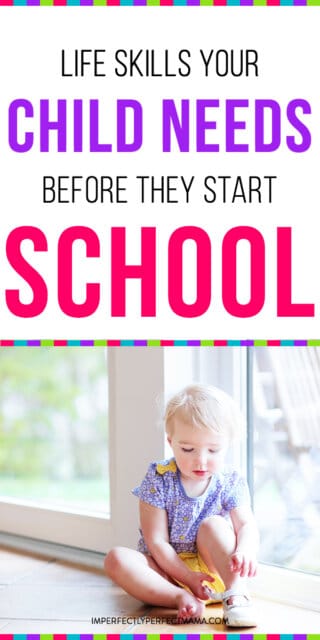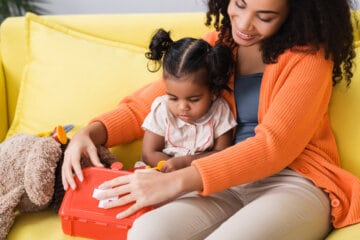Before you know it, your little baby is all grown up and ready to start school.

Parents often worry about what their child should know before that first term begins.
Just what should your child be able to do by themselves?
Here are five simple skills you can work on before your child starts school.
1. How to Get Dressed
Don’t panic! No teacher will expect your child to have mastered tying their shoes but you can make sure your child is familiar with some of the basics, such as:
- Putting on and taking off socks and shoes
- Pulling clothes up and down
- Doing up and undoing buttons
- Pulling zippers up and down
- Putting sweaters and t-shirts on over their head and lifting them off
- Putting arms into sleeves
- Turning clothes around the right way
Some children love taking care of their own clothes, for others it can feel like a battle.
Make getting dressed a fun race against the clock or consider using a simple sticker chart. This can help your child take an interest in getting dressed.
2. Use the Toilet Independently
Generally, children should be potty trained before the age of five. If your child is finding it difficult to move on from diapers, consult your family doctor for advice.
Learning to use the toilet involves mastering a lot of small steps. Keep things light-hearted whilst you practise at home. Don’t worry about the occasional accident – schools are very used to this.
Children find it easier to remember a routine so make sure every time they go to the toilet, they follow the same pattern. Reminding them to wash their hands each time will help them remember when they are in school.
3. Sharing and Turn-Taking
Children are not natural sharers! They feel very attached to their own belongings and they might struggle to share with siblings and friends.
At school, all children are expected to take turns with games and equipment. Teachers know they will need support with this at first.
Use playdates as an opportunity to practise sharing and taking turns with toys. Always look for the positives, even when they’re struggling. Praise them when they manage to share with another child.
If your child struggles to share or take turns, you could try:
- Suggesting a time limit before letting a friend have a go
- Alternating who goes first with a game or activity
- Roleplay a story using dolls about how to share
- Making it a big deal when your child does share with another child. Give them a hug and a smile, and tell them what they did well
- Pointing out sharing and turn-taking in stories
4. Independence Skills
Most children are very independent and like to do things for themselves. Yet, it is easy to fall into the trap of doing things for them to save time.
Before you know it, you are fetching and carrying for them and tidying up their mess. In a busy classroom, you don’t want your child to have to wait for an adult every time they need something.
At home, start to practise independence by encouraging them to do as much as they can by themselves. The trick is to give the least amount of help possible for them to be successful.
Think about what you could expect your child to do at home for themselves; they are never too young for chores. They could:
- Cut up their food
- Lay the table
- Fill their cup
- Choose their clothes for the day
- Put dirty laundry in the basket
- Tidy away toys and games after using them
- Make their bed
- Feed pets
- Put away groceries
5. Talking to Others
As a parent, you want to keep your child safe. It’s easy to keep your children close to you for fear of stranger danger.
At school, however, your child will meet lots of new children and adults. They will need to know how to communicate with them, without your guidance.
Start to develop your child’s communication skills with familiar adults. Encourage them to look at people when they are speaking and answer politely. Give time for your child to play with friends without your direct involvement.
Outside of the house, your child can take the lead in communicating with strangers under your supervision, such as:
- Ordering their own food in a restaurant
- Paying for something
- Saying thank you to staff in a grocery store
Praise your child when they talk to someone new.
When needed, remind them of key safety messages, such as never leaving with someone without asking your parents first.
Children are Individuals
Children all learn at different rates. Some will go to school prepared and ready for the new challenges. Others will feel far less confident and need some extra support as they start school.
Practicing key life skills at an early age is great for giving them the preparation they need for a successful start.
What do you think your child should know before school begins? What advice would you give other parents?




Leave a Reply